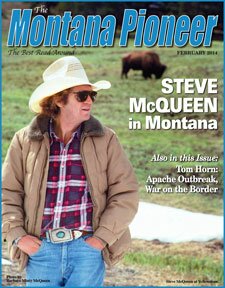
February 2014

Steve McQueen in Montana
The Famous Actor and His Beautiful Wife Loved Livingston
Read article here
____________________________________
Jeanette Rankin and Belle Winestine
In honor of the Centennial of Women's Suffrage in Montana
Read article here
____________________________________
McQueen, the Back Story
Read article here
____________________________________
An Apache Outbreak,War on the Border
Chiricahua Apaches Defy and Fight U.S. and Mexican Soldiers
Read article here
____________________________________
Food Police a Real Possibility?
For Some, It’s an Idea Whose Time Has Come
Read article here
____________________________________
The Real Wolf Does Not Let Sleeping Dogs Lie
Authors Say It Is Pro-Wolfers Who Propagate Myths
Read article here
______________________
Letters to the Editor
Read article here
______________________
|
|
How Do You Say Absaroka?
Pronunciations Vary
By David S.Lewis
Absaroka is absolutely the most confusing of all regional words. How is it pronounced? That depends on who you are and where you live. People new to the area and from elsewhere pronounce the word Ab-suh-ROKE-uh (the last two syllables rhyme with polka), but a dictionary’s pronunciation key does not agree. Formally, Absaroka, as in the Absaroka Mountains, is pronounced with the accent on the second syllable. That A is soft followed by a soft O, as in look: something like Ab-SAR-uh-kuh, or according to the American Heritage Dictionary: ab-sär'u-ku. This, as we shall see, approximates but does not replicate the original Crow Indian pronunciation.
If this weren’t confusing enough, most Montanans within a two-hour drive of the actual mountains call them the Ab-zor-kuhs, again with the accent on the second syllable but leaving out the O all together. We can imagine the mountain men of the 1800s having evolved this pronunciation, and the alternate but even more colloquial Absorkee—something Liver Eatin’ Johnson might have uttered (better yet, Jed Clampett).
Applying a bit of common sense and the guess work that accompanies ety-mology (the study of word origins), it’s not hard to surmise how these multiple pronunciations came into usage. Absaro-ka is the name for the Crow Indian tribe in their native language. It means Bird People, or as certain Crow Indians inform us, People of the Big Beaked Bird (not necessarily a crow). But the Crow pronunciation differs from all the aforementioned. Hearing a Crow Indian pronounce the name of his tribe, it is easy to understand why whites who first began speaking the word had trouble with it. As with many languages, Crow contains sounds that are not easily represented by the English alphabet. The Crow originally pronounced and now spell the word Apsalooka (ap-SUH-luh-guh), the accent being again on the second syllable, not the double O which is soft, although I have heard Crow Indians pronounce that double O and accent it so that the word sounds like ap-suh-LUKE-uh. In their aboriginal pronunciation, the B in the first syllable is as much a P. The R sounds more like an L, the double O is soft, and the K is almost a G—Ap-SUH-luh-guh: people of the big beaked bird.
This uncertainty regarding pronunciation occurs in other attempts to transliterate words from languages that produce sounds English does not have. The spelling of Peking, for instance (the Chinese capital) is a variant of Beijing, not because the Chinese changed the name of the their capital, but because the revised spelling more closely approximates how the word is pronounced in Chinese. It’s safe to say, though, that when the Chinese pronounce the name of their capital it doesn’t sound exactly like Peking or Beijing—not when a P becomes a B and a K becomes a J in a foreigner’s attempt to reproduce the phonetics. What’s more, the word has also been spelled Peiping. A more recent example of the same type of thing was the changing of Bombay to Mumbai (neither the M nor the B exactly represent the the sound as pronounced in India).
Asian mouths and vocal chords simply make sounds that ours do not (unless retrained) and vice versa—hence the amusing flied lice, owing to the fact that when God gave certain peoples the gift of speech, he forgot to adequately distinguish the letters R and L. For Japanese speakers of English these letters are problematic. For them, when an L or R occur in the middle of a word it is difficult to distinguish which sound it is, because most Japanese use the sounds L and R interchangeably in the middle of a word. They simply have trouble getting their mouths to make the new sound unless the R is preceded by a vowel at the beginning of a word, as in arigato. The pronunciation of the name of actor Roger Moore, though, emerges as something like Logel Mooleh. (Then there’s the Ng sound at the beginning of south east Asian words with which western mouths have a hard time. My Asian wife tutors me in this pronunciation, but with limited success.
The L and R sounds also get confused in the anglicized Absarokas (and you thought I wasn’t going anywhere with this.) A long, long time ago, perhaps some common ancestor of both the Crow and Japanese crossed the mythical land bridge from Asia into what is now North America, bringing with him this phonetic confusion—finding the town of Rivingston, he of course mispronounced it and the town became—well, the rest is history. What he actually crossed, then, would have been a rand blidge.
Following up, why do people from New England, New York and Britain fail to pronounce Rs when they should and add them when they shouldn’t. Car becomes Cah, and Cuba Cuber. And then some people say warsh instead of wash but not squarsh instead of squash. What’s up with that? Somebody needs to have a talk with them—what did they do, closs a rand blidge or something?
|
|
|

